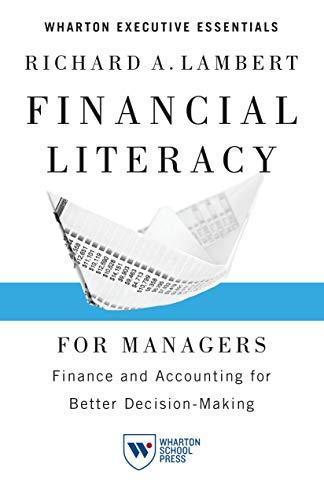Question
For your job as the business reporter for a local newspaper, you are given the task of putting together a series of articles that explain
For your job as the business reporter for a local newspaper, you are given the task of putting together a series of articles that explain the power of the time value of money to your readers. Your editor would like you to address several specific questions in addition to demonstrating for the readership the use of time value of money techniques by applying them to several problems. What would be your response to the following memorandum from your editor?
To: Business Reporter From: Perry White, Editor, Daily Planet Re: Upcoming Series on the Importance and Power of the Time Value of Money In your upcoming series on the time value of money, I would like to make sure you cover several specific points. In addition, before you begin this assignment, I want to make sure we are all reading from the same script, as accuracy has always been the cornerstone of the Daily Planet. In this regard, I'd like a response to the following questions before we proceed:
f. What is the present value of an ordinary annuity of $2,600 per year for 21 years discounted back to the present at 15 percent? What would be the present value if it were an annuity due? (Round to the nearest cent.)
g. What is the future value of an ordinary annuity of $2,600 per year for 21 years compounded at 15 percent? What would be the future value if it were an annuity due? (Round to the nearest cent.)
h. You have just borrowed $290,000, and you agree to pay it back over the next 10 years in 10 equal end-of-year payments plus 11 percent compound interest on the unpaid balance. What will be the size of these payments? (Round to the nearest cent.)
i. What is the present value of a perpetuity of $1,200 per year discounted back to the present at 14 percent? (Round to the nearest cent.)
j. What is the present value of an annuity of $1,100 per year for 10 years, with the first payment occurring at the end of year 10 (that is, ten $1,100 payments occurring at the end of year 10 through year 19), given a discount rate of 18 percent? (Round to the nearest cent.)
k. Given a discount rate of 16 percent, what is the present value of a perpetuity of $1,800 per year if the first payment does not begin until the end of year 10? (Round to the nearest cent.)
Step by Step Solution
There are 3 Steps involved in it
Step: 1

Get Instant Access to Expert-Tailored Solutions
See step-by-step solutions with expert insights and AI powered tools for academic success
Step: 2

Step: 3

Ace Your Homework with AI
Get the answers you need in no time with our AI-driven, step-by-step assistance
Get Started


